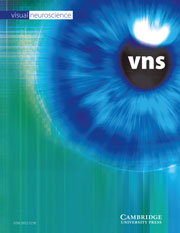Crossref Citations
This article has been cited by the following publications. This list is generated based on data provided by
Crossref.
Reppas, John B
Usrey, W.Martin
and
Reid, R.Clay
2002.
Saccadic Eye Movements Modulate Visual Responses in the Lateral Geniculate Nucleus.
Neuron,
Vol. 35,
Issue. 5,
p.
961.
Martinez-Conde, Susana
Macknik, Stephen L.
and
Hubel, David H.
2002.
The function of bursts of spikes during visual fixation in the awake primate lateral geniculate nucleus and primary visual cortex.
Proceedings of the National Academy of Sciences,
Vol. 99,
Issue. 21,
p.
13920.
Royal, David
and
Casagrande, Vivien
2003.
The Primate Visual System.
Vol. 20034786,
Issue. ,
Livingston, Christine A.
and
Fedder, Stacey Rickert
2003.
Visual-Ocular Motor Activity in the Macaque Pregeniculate Complex.
Journal of Neurophysiology,
Vol. 90,
Issue. 1,
p.
226.
Ramcharan, Eion J.
Gnadt, James W.
and
Murray Sherman, S.
2003.
Single-unit recording in the lateral geniculate nucleus of the awake behaving monkey.
Methods,
Vol. 30,
Issue. 2,
p.
142.
Purpura, Keith P.
Kalik, Steven F.
and
Schiff, Nicholas D.
2003.
Analysis of Perisaccadic Field Potentials in the Occipitotemporal Pathway During Active Vision.
Journal of Neurophysiology,
Vol. 90,
Issue. 5,
p.
3455.
Alitto, Henry J
and
Usrey, W Martin
2003.
Corticothalamic feedback and sensory processing.
Current Opinion in Neurobiology,
Vol. 13,
Issue. 4,
p.
440.
Kenigfest, Natalia
Rio, Jean‐Paul
Belekhova, Margarita
Repérant, Jacques
Vesselkin, Nikolai
and
Ward, Roger
2004.
Pretectal and tectal afferents to the dorsal lateral geniculate nucleus of the turtle: An electron microscopic axon tracing and γ‐aminobutyric acid immunocytochemical study.
Journal of Comparative Neurology,
Vol. 475,
Issue. 1,
p.
107.
Krahe, Rüdiger
and
Gabbiani, Fabrizio
2004.
Burst firing in sensory systems.
Nature Reviews Neuroscience,
Vol. 5,
Issue. 1,
p.
13.
Kleiser, Raimund
Seitz, Rüdiger J
and
Krekelberg, Bart
2004.
Neural Correlates of Saccadic Suppression in Humans.
Current Biology,
Vol. 14,
Issue. 5,
p.
386.
Michels, Lars
and
Lappe, Markus
2004.
Contrast dependency of saccadic compression and suppression.
Vision Research,
Vol. 44,
Issue. 20,
p.
2327.
Cullen, Kathleen E
2004.
Sensory signals during active versus passive movement.
Current Opinion in Neurobiology,
Vol. 14,
Issue. 6,
p.
698.
Knüsel, Philipp
Wyss, Reto
König, Peter
and
Verschure, Paul F.M.J.
2004.
Decoding a Temporal Population Code.
Neural Computation,
Vol. 16,
Issue. 10,
p.
2079.
Denning, Kate S.
and
Reinagel, Pamela
2005.
Visual Control of Burst Priming in the Anesthetized Lateral Geniculate Nucleus.
The Journal of Neuroscience,
Vol. 25,
Issue. 14,
p.
3531.
Lee, J.-I.
Ohara, S.
Dougherty, P. M.
and
Lenz, F. A.
2005.
Pain and Temperature Encoding in the Human Thalamic Somatic Sensory Nucleus (Ventral caudal): Inhibition-Related Bursting Evoked by Somatic Stimuli.
Journal of Neurophysiology,
Vol. 94,
Issue. 3,
p.
1676.
Casagrande, Vivien. A.
Sáry, Gyula
Royal, David
and
Ruiz, Octavio
2005.
Cortical Function: a View from the Thalamus.
Vol. 149,
Issue. ,
p.
11.
Sylvester, Richard
Haynes, John-Dylan
and
Rees, Geraint
2005.
Saccades Differentially Modulate Human LGN and V1 Responses in the Presence and Absence of Visual Stimulation.
Current Biology,
Vol. 15,
Issue. 1,
p.
37.
Wurtz, Robert H.
Sommer, Marc A.
and
Cavanaugh, James
2005.
Cortical Function: a View from the Thalamus.
Vol. 149,
Issue. ,
p.
207.
Sylvester, Richard
and
Rees, Geraint
2006.
Extraretinal saccadic signals in human LGN and early retinotopic cortex.
NeuroImage,
Vol. 30,
Issue. 1,
p.
214.
Tucker, Thomas R.
and
Fitzpatrick, David
2006.
Luminance-Evoked Inhibition in Primary Visual Cortex: A Transient Veto of Simultaneous and Ongoing Response.
The Journal of Neuroscience,
Vol. 26,
Issue. 52,
p.
13537.

